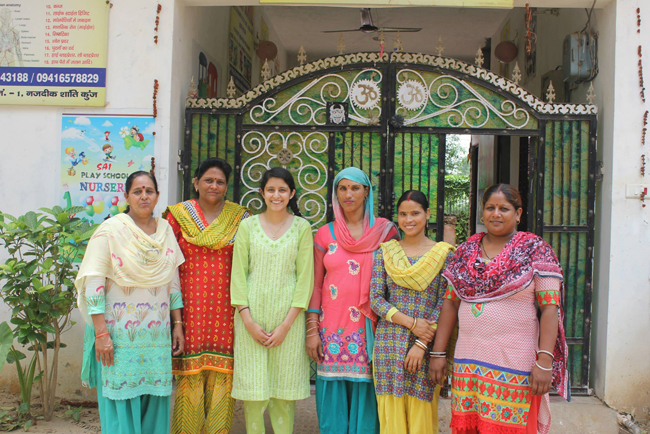
Prabha Dublish pictured in India. Courtesy photo
When Derek Tu and Prabha Dublish met in April of 2014, it wasn’t for immediate collaboration. It was actually in a form of competition. The two were finishing up their senior years in high school and vying for Babson College’s coveted Weissman Scholarship–a full-ride merit-based scholarship with an additional $20,000 in seed cash spread out over four years. Dublish ultimately won the scholarship, but the experience proved to be the start of a friendship and two years later, the budding of a social venture called Womentum. Legally classified as a nonprofit, Womentum is the newest donation-based crowdfunding platform. But where Womentum differs from an Indiegogo or Kickstarter is the entrepreneurs are all women and are placed on the platform through strategic partnerships Tu and Dublish have established with other nonprofits around the globe.
And for the two 19-year-olds, the startup focused on shattering the walls of generational poverty is just as much personal as it is a cool B-school project. The idea came to Dublish after a summer trip to India, which focused on women entrepreneurs. Dublish was leaving a movie theater in Delhi when she saw a boy that looked about five years old visibly malnourished and nearly naked. The sight shocked her. As she met with women in the area and asked them about their businesses–many of them seamstresses–she learned about two barriers: lack of funding and lack of community support.
For Tu, the cycle of generational poverty hits even closer to home. His family immigrated from Canada to the Chicago area when he was five with just $200. “I envied the other kids at school with Game Boys and Yu-Gi-Oh cards and blamed my parents for the conditions we found ourselves in,” Tu remembers, noting it was only through the generosity of others and his parent’s hard work that his family was able to break the clutches of poverty. “I didn’t realize at the time how lucky I was,” Tu continues. “I’ve gone back to the area where I grew up in Canada, and some of those I grew up with weren’t as fortunate.”

Prabha Dublish
EMPOWERING WOMEN ENTREPRENEURS WHEN FEW OTHERS WILL
So when Dublish approached Tu with her idea to find financial and community support for Indian women keen on entrepreneurship, the fit was natural. They snagged Northwestern student, Aaron Leon as a site developer and when the platform is fully launched in a few weeks, users may read about the women entrepreneurs in India, Uganda, Malawi and California, what their projects are and why they need some extra cash to get them going. The community support deficiencies are made up through donor interaction. The donors receive updates from the women and can communicate with the entrepreneurs themselves.
“I’ve always been interested in how people can use entrepreneurship to change their lives,” Dublish says about her original reasons for research in India. “And also, how to leverage the resources available to them to start small-scale businesses.”
Of course the United States is a cauldron and bubble of entrepreneurship. Investment money flies around like autumn leafs. And while there is certainly a gender gap in entrepreneurship and said funding, it’s not even comparable to other places in the world where women are socially pressured and looked down on for not fitting “traditional” norms. “The women couldn’t just go to a bank and ask for money. That wasn’t going to happen in India,” Dublish explains. “I was really astounded by how the families would look down on them for leaving that traditional role that was so expected in India.”











Questions about this article? Email us or leave a comment below.